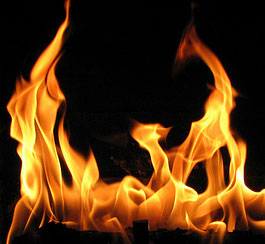The Chicago Tribune is “Playing with Fire.” In a weeklong series on flame retardants, a team of journalists eviscerates Big Chem, its star witness, and the astroturf groups that are “part of a decades-long campaign of deception that has loaded the furniture and electronics in American homes with pounds of toxic chemicals linked to cancer, neurological deficits, developmental problems and impaired fertility.”
Earlier this year, we examined the testimony of Dr. David Heimbach, star witness for Big Chem, suggesting Heimbach’s testimony was either deceptive or uninformed. Our fisking gave him the benefit of the doubt. The Tribune dug deeper. Its reporters studied Heimbach’s testimony from the past three years and found he wasn’t simply uninformed. He lied.
In 2009, 2010, and 2011, Dr. Heimbach testified on three separate cases involving severely burned infants—each the result of candle-started fires. The Trib notes Heimbach’s impassioned testimony of the babies’ deaths “made the long-term health concerns about flame retardants voiced by doctors, environmentalists and even firefighters sound abstract and petty. But there was a problem with his testimony: It wasn’t true.”
No patients matching Heimbach’s descriptions died at Harborview Medical Center, where Heimbach practiced, according to the King County medical examiner’s office. Hospital records show a six-week-old baby named Nancy Garcia-Diaz died at Harborview in 2009, but she did not die under the circumstances Heimbach described.
In his most recent testimony, Heimbach stated the baby was resting in a crib on a fire-retardant mattress and on a non-retardant pillow. Describing the baby’s burns, Heimbach said the upper half of her body was burned. Public records show “there was no crib—she was resting on a bed — and no pillow.” A representative from the Snohomish County fire marshal’s office said the presence of flame retardants played no role in the pattern of her burns. What’s more, the cause of the fire was an overloaded extension cord, not a candle.
Dr. Heimbach isn’t even able to defend himself consistently. Heimbach acknowledges his three testimonies aren’t about different babies but about a single child. He described his inconsistent testimony as “an anecdotal story rather than anything which I would say was absolutely true under oath, because I wasn’t under oath.” Then he suggested he intentionally changed the facts to protect patient privacy. But, as the Trib notes, “the most crucial parts of his testimony—the cause of the fire and the lack of flame retardants — had nothing to do with privacy. Instead, they served to bolster the industry’s argument that chemical retardants save lives.”
Nancy’s mother, whom Heimbach most recently libeled by contending she placed a candle in her daughter’s crib, said, “Nancy’s memory is sacred to us. My daughter deserves respect. She lived such a short time and she suffered a lot. This is horrible.”
The debunking of Dr. Heimbach is just part of the Tribune series. It’s the part that’s on the cover of today’s Seattle Times. It’s worth your time to check out the whole series and then catch up on Sightline’s research on toxic couches. Let’s hope the unmasking of Dr. Heimbach’s lies will help California adopt a fire-safety standard for furniture that actually works.
Valerie Pacino is a Sightline Intern and a Master of Public Health student at the University of Washington.
Read more about toxic couches:









